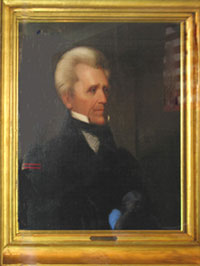
ca. 1785-1838
Ralph E. W. Earl, portraitist, was the son of Connecticut painter Ralph Earl (1751-1801) and his second wife, Anne Whiteside of Norwich, England. Born in England, Earl studied under his father in Northhampton, Massachusetts, before traveling to London in 1809 to study under Benjamin West and John Trumbull. After a year in London, he spent four years in Norwich with his grandfather and uncle before journeying to the Continent for a year in Paris. While there, he was able to see, as the result of Napoleon Bonaparte’s recent conquests, many of the Europe’s greatest paintings.
On January 1, 1817, Earl arrived in Nashville to paint the portrait of General Andrew Jackson, the hero of the battle of New Orleans. Later that year, in Natchez, he met and married Jane Caffrey, Rachel Jackson’s niece. She died the next year, but Earl moved into the Hermitage and into Jackson’s circle. From 1818 until 1827 he directed the Nashville Museum of “natural and artificial curiosities” on the Public Square. The museum included ten of Earl’s portraits.
When Jackson went to Washington as president, Earl went with him. During the next eight years, Earl turned out numerous paintings of Jackson, some of distinction, but many repetitious in nature and mediocre in quality, political icons rather than art. Politicians, especially Democrats, knew it “did not hurt to order a portrait of General Jackson from Earl.” He painted many of Jackson’s friends and a few of his foes. He designed the invitation to Lafayette’s ball in Nashville in 1825, as well as the guitar-shaped driveway and concentric flower beds at the Hermitage. He also executed decorative interior painting at neighboring Tulip Grove. Earl returned to the Hermitage with Jackson in 1837 and died there in September 1838.
James C. Kelly, Virginia Historical Society
Tennessee Encyclopedia of History and Culture, 1998


